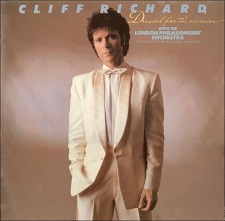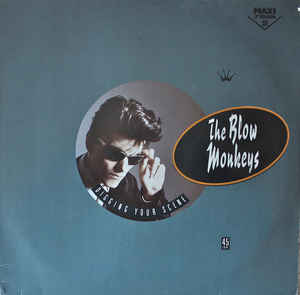Related Research Articles

"Secret Love" is a song composed by Sammy Fain (music) and Paul Francis Webster (lyrics) for Calamity Jane, a 1953 musical film in which it was introduced by Doris Day in the title role. Ranked as a number 1 hit for Day on both the Billboard and Cash Box, the song also afforded Day a number 1 hit in the UK. "Secret Love" has subsequently been recorded by a wide range of artists, becoming a C&W hit firstly for Slim Whitman and later for Freddy Fender, with the song also becoming an R&B hit for Billy Stewart, whose version also reached the top 40 as did Freddy Fender's. In the UK, "Secret Love" would become the career record of Kathy Kirby via her 1963 remake of the song. The melody bears a slight resemblance to the opening theme of Schubert's A-major piano sonata, D.664.
Steel River was a Canadian rock group formed in Toronto, which performed primarily during the 1970s.

"You Give Good Love" is the debut solo single by American singer Whitney Houston for her 1985 eponymous debut studio album. It was written by La Forrest 'La La' Cope and produced by Kashif. When La La sent Kashif a copy of the song, originally offered to Roberta Flack, she thought it would be a better fit for Houston and told Arista Records he would be interested in recording with her.

"Ain't It Funny (Murder Remix)" is a song by American singer Jennifer Lopez for her remix album J to tha L–O! The Remixes (2002). The song was marketed as a remix of "Ain't It Funny", but is actually an entirely different song with the same title. It features guest vocals from Ja Rule (Jeffrey Atkins) and Caddillac Tah (Tiheem Crocker). It was written by Lopez, Atkins, Tah, Cory Rooney, Irving Lorenzo, and Ashanti. Over a reworking of the beat to Craig Mack's "Flava in Ya Ear" (produced by Easy Mo Bee), Lopez sings about "dropping a boyfriend who keeps messing up".

Apartment Life is the second studio album by American band Ivy, released by Atlantic Records on October 6, 1997. After being dropped from Seed Records following the release of Realistic in 1995, the group signed to Atlantic due to connections that Adam Schlesinger had with the record label. In addition to band members Andy Chase and Schlesinger, the album was produced by Lloyd Cole and Peter Nashel. In contrast to their previous releases, such as Lately (1994) and Realistic, Apartment Life is a pop album with varying forms of production consisting of keyboards, brass, and string instruments. Some of the compositions featured on the record were compared to the works of My Bloody Valentine, Pixies, and the Smiths. To promote the album, Ivy embarked on a series of promotional tours across the United States.

"Shake Me, Wake Me " is a song recorded by the American quartet Four Tops for their third studio album, On Top (1966). It was released in February 1966 as a 7" vinyl single through Motown records. It was written and produced by Brian Holland, Lamont Dozier, and Eddie Holland. A gospel rock track, its lyrics detail a relationship that has ended. It has since been regarded as one of Four Tops' most successful singles ever. It charted moderately well in both the United States and Canada, and became the group's fifth consecutive entry to chart within the top five of the Hot R&B/Hip-Hop Songs chart. Four Tops has performed "Shake Me, Wake Me " on various occasions throughout their careers and have included it on several greatest hits albums, including on The Four Tops Greatest Hits (1967) and The Ultimate Collection (1997).

Barbra Streisand's Greatest Hits Volume 2 is the second greatest hits album recorded by American vocalist Barbra Streisand. It was released on November 15, 1978 by Columbia Records. The album is a compilation consisting of ten commercially successful singles from the singer's releases in the 1970s, with a majority of them being cover songs. It also features a new version of "You Don't Bring Me Flowers", which was released as the collection's only single on October 7, 1978. Originating on Streisand's previous album, Songbird, the new rendition is a duet with Neil Diamond who had also recorded the song for his 1978 album of the same name. The idea for the duet originated from DJ Gary Guthrie who sold the idea to the record label for $5 million.

"Here We Go Again" is a country music standard written by Don Lanier and Red Steagall that first became notable as a rhythm and blues single by Ray Charles from his 1967 album Ray Charles Invites You to Listen. It was produced by Joe Adams for ABC Records/Tangerine Records. To date, this version of the song has been the biggest commercial success, spending twelve consecutive weeks on the US Billboard Hot 100 chart, peaking at number 15.

The Owl and the Pussycat is the soundtrack album to the 1970 American film of the same name. Released by Columbia Records, it features film dialogue by Barbra Streisand and George Segal recorded over music performed by American band Blood, Sweat & Tears. The album's five tracks were all written by Buck Henry, produced by Thomas Z. Shepard.

"Didn't We" is a song recorded by Irish singer and actor Richard Harris for his debut studio album, A Tramp Shining (1968). It was written and produced by Jimmy Webb and originally served as the B-side to Harris' 1968 single "MacArthur Park". "Didn't We" was then distributed as the record's single by Dunhill Records, also in 1968. A traditional pop song, Harris sings about his life in the past. Commercially, it charted at lower positions of both the United States and Canada, and in the higher ranks of their Adult Contemporary component charts. Harris featured "Didn't We" on several of his greatest hits albums, including The Richard Harris Collection: His Greatest Performances from 1973. That same year, the song was reissued as a promotional single paired alongside his 1971 single "My Boy".

Dressed for the Occasion is an album by English singer Cliff Richard, recorded live with the accompaniment of the London Philharmonic Orchestra at the Royal Albert Hall in November 1982. It was released in May 1983 on the EMI label and reached No. 7 in the UK Albums Chart and No. 30 in Australia. It was certified Silver in the UK.

"Digging Your Scene" is a song recorded by English band the Blow Monkeys for their second studio album, Animal Magic (1986). The single was released in February 1986 as the second one from the parent record. It was written by lead singer Dr. Robert, while Howard, Peter Wilson, and Adam Moesley produced it. Musically a pop, soul, and jazz song, "Digging Your Scene" discusses the hatred and disgust that is associated with individuals who have HIV and AIDS. Several media professionals felt the song's subject matter would be the subject of criticism.
"Edge of Reality" is a song first recorded by Elvis Presley as part of the soundtrack for his 1968 motion picture Live a Little, Love a Little, released to cinemas on October 23.

"Guava Jelly" is a song recorded by the Jamaican group Bob Marley and the Wailers. It was released as a 7" vinyl single through Tuff Gong and Green Door Records. It was issued commercially with B-side track "Redder Then Red", which was misspelled on its initial printing, in 1971. It was written and produced by Marley and features uncredited lyrical contributions from Bunny Livingston. A reggae composition like the majority of Marley's works, "Guava Jelly" contains a rocksteady and island-like production with lyrics loosely based around sexual intercourse. His use of the term "guava jelly" was likely referring to a specific type of sexual lubricant. It was favorably viewed by several reviewers, with many of them finding the composition to be sexual and about love. The group placed "Guava Jelly" on several compilation albums, including Africa Unite: The Singles Collection in 2005, and Owen Gray and Herbie Mann created their own versions in 1974 and 1975, respectively.

Score is the debut album by American recording artist Carol Lloyd, released on December 31, 1979, through Casablanca Records and Earmarc Records. Following Lloyd's signing with Earmarc, a new label division of Casablanca, she began recording material for the record throughout the latter half of 1979. A disco album, Score was one of the first projects to be released from the label, which specialized solely in disco music. All six of the tracks on the record were produced by Michael Forte and Bruce Weeden, with the former individual also contributing lyrics to four of the aforementioned songs.

"Ghetto Day" and "What I Need" are two songs by American singer-songwriter Crystal Waters, issued as a double A-side in June 1994 as the second single from her second studio album, Storyteller (1994). It was produced by the Basement Boys and released by Mercury Records, A&M Records and A&M's division AM PM. Waters and Sean Spencer wrote "Ghetto Day", which is a funk song that contains samples from The 5th Dimension's song "Stoned Soul Picnic" and Flavor Unit's "Flavor Unit Assassination Squad". According to Spin, the track's lyrics talk about "those balmy, front-stoop, 40-swinging summer afternoons." The single's second A-side, "What I Need", is a house track written by Waters, Doug Smith and Richard Payton.

Love Carol is the second and final studio album released by American singer Carol Lloyd, released in 1983 by Philly World Records.

"Shame" is a song by American new wave band The Motels, which was released in 1985 as the lead single from their fifth studio album Shock. The song was written by Martha Davis and produced by Richie Zito. "Shame" peaked at number 21 on the US Billboard Hot 100.

"Remember the Nights" is a song by American new wave band The Motels, which was released in 1983 as the second single from their fourth studio album Little Robbers. The song was written by Martha Davis and Scott Thurston, and produced by Val Garay. "Remember the Nights" peaked at number 36 on the US Billboard Hot 100.

Maria Vidal is the debut studio album by American singer Maria Vidal, released by A&M in 1987.
References
- ↑ Billboard staff (August 18, 1979). "4 Acts Tie with Marc P. Simon, EarMarc Label". Billboard . Vol. 91, no. 33. Nielsen Business Media, Inc. p. 15. ISSN 0006-2510 . Retrieved March 19, 2017.
- ↑ Billboard staff (May 21, 1977). "Philadelphia is no longer a one studio town". Billboard. Vol. 89, no. 20. Nielsen Business Media, Inc. p. 39. ISSN 0006-2510 . Retrieved March 19, 2017.
- ↑ Score (Liner notes). Carol Lloyd (Vinyl release ed.). Casablanca, Earmarc. 1979. EMLP 4002.
{{cite AV media notes}}: CS1 maint: others in cite AV media (notes) (link) - 1 2 Billboard staff (December 22, 1979). "Billboard's Top Single Picks: For Week Ending 12/22/79". Billboard. Vol. 91, no. 51. Nielsen Business Media, Inc. p. 76. ISSN 0006-2510 . Retrieved March 18, 2017.
- ↑ Love Carol (Liner notes). Carol Lloyd (Vinyl release ed.). Philly World. 1983. PWLP 1004.
{{cite AV media notes}}: CS1 maint: others in cite AV media (notes) (link) - ↑ "Carol Lloyd – Love Carol (Remastered)". iTunes Store (US). June 24, 2014. Retrieved March 26, 2017.
- ↑ "Carol Lloyd – Score (Remastered)". iTunes Store (US). May 11, 2010. Retrieved March 19, 2017.
- ↑ "Carol Lloyd Chart History (Dance Club Songs)". Billboard . Archived from the original on May 11, 2018. Retrieved February 3, 2018.